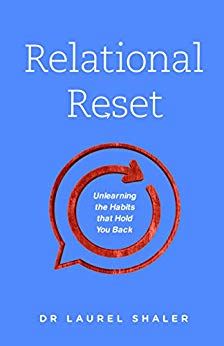5 Harmful Habits You Need to Unlearn in the New Year

We all know about bad habits, and every year around this time, people commit to kicking them to the curb. New Year’s resolutions often center around those harmful practices that are hard to give up. In order to be successful, you not only have to change behaviors but thoughts and attitudes too. Many of these not only impact us personally, but they impact our relationships too. If you’re someone who struggles with a friend, a spouse, a parent, or any other kind of relationship, consider what habits you can unlearn this New Year. Here, we’ll look at five:
1. Insecurity
Do you struggle with insecurity? Perhaps you find yourself feeling like you’re not worthy of something in your relationships—of love, of attention, of time together, of forgiveness. Don’t feel good enough? Smart enough? Attractive enough? That’s insecurity.
Perhaps there’s a negative voice from your past that you keep hearing in your mind, like a song on repeat. (You talk too much. You are just too sensitive! Are you sure you can handle that?) Except the voice in your head is so much worse than the current pop song you heard in the waiting room at the doctor’s office. Maybe the negative voice you’re hearing is your own. The reality is this: Everyone is insecure about something.
The good news is this: You can silence the insecurity. It may not be possible 100 percent of the time, because so often we get in our own way. But we can definitely get a better handle on this issue that’s been ailing us. It’s time to evict the critics that have lived far too long in our own minds—those shaming, negative voices that weigh us down, leaving us distracted from what really matters.
Insecurity damages relationships, while being secure strengthens them. If I know my self-worth and my identity in Christ and seek His approval, then I will feel freer to be myself, to be honest, to set boundaries, to let go of envy and blame, and to use my relationships to glorify God rather than to satisfy myself.
2. Disappointment
We all have disappointments, some small and some great, from the game being rained out to a failed adoption. Disappointments can start off like a snowball that rolls down a hill, gathering more and more snow until it becomes a snow “boulder.”
Often, our disappointments are related to other people, and regardless of size, they can cause us a lot of heartache. Your child’s father cancels another visitation, leaving you angry and your son disappointed. Your teenage daughter sneaks out of the house to meet up with a boy. Yeah, you’re definitely not happy with her. Your friend cancels your lunch date for the third time in a row. How disappointing. Whether trivial or earth-shattering, disappointing events can have a tremendous impact on our emotional well-being and on our relationships. How we react to these blows not only affects the relationship we have with the one who failed us but all of our other relationships. One person disappoints us, so we expect others to. Or, we can’t move past the setback, and we anticipate that the same person will disappoint us repeatedly; we wind up feeling angry and anxious.
All of us can benefit from having this expectation: people will disappoint us. Friends will disappoint us. Family will disappoint us. Fellow church members, neighbors, employers, colleagues . . . they will all disappoint us. We’ll disappoint others too. If we’re not careful, we’ll expect perfection from others. If so, when disappointment comes, it can crush us and our relationships. The Lord knows we don’t want anyone expecting us to be perfect, so we shouldn’t expect that from others either.
3. Blame
Imagine you can’t find your keys. You just know your husband moved them because you are positive you left them on the kitchen counter, and since he cleaned up the kitchen, he must have put them somewhere. He insists he didn’t touch your keys, but you remain irritated with him because you are sure he did something with them. Thirty minutes later, you put on your coat to go outside for a walk—and discover your keys in the pocket.
Now imagine it’s he who misplaced his keys and blamed you instead of the other way around. We only need to consider a time when we’ve been blamed for someone else’s actions to know that this is no fun. If you’ve had kids, been around kids, or been a kid yourself, you know how children blame one another. They don’t want to accept responsibility for their own actions. They want to avoid punishment. They may even want to avoid disappointing the adult who is correcting them. I have two nephews. One time when they were riding in my back seat, I heard a noise that was unmistakably one hitting the other. I immediately asked who hit whom. They both blamed the other. To this day, I don’t know which child hit the other one.
Sadly, we adults are often no better than the children we once were. We blame other people. We don’t want to accept responsibility. We don’t want to receive our punishment. We don’t want to disappoint others. But blaming others keeps us emotionally stunted and only serves to hinder our relationships. It causes us to become angry, bitter, and distant from one another. If you want relationships that are healthy and satisfying, you’ll commit to the work of learning to accept responsibility for your actions, thoughts, and feelings, and to stop playing the blame game.
4. Envy
Are you ready to feel less jealous and feel more grateful? If so, take some time to count your blessings. Consider your shelter (regardless of the size of your home), your clothing (regardless of the brands), and your transportation (regardless of the mode). Consider your health and healthcare. Consider your achievements (and don’t let the world define them for you . . . what have you accomplished that God called you to?). Consider your education (no one can take it away . . . and this doesn’t only refer to degrees) and employment (or consider your retirement or your opportunity to stay home with children full time). Consider your freedom and safety. Consider your community. Consider your family and friends. Consider your church. Most of all, consider your faith!
But don’t stop there. Consider what you see in the lives of others that you can celebrate along with them. Theodore Roosevelt was right when he reportedly said, “comparison is the thief of joy.” When we compare ourselves with others, it robs us of joy. We start to compete with them. This competition drives us to want to be “better than”—and to become envious when this isn’t achieved. But if we can learn to truly be happy for the good things in other people’s lives, we’ll be far less likely to envy them for those good things.
If you struggle with jealousy, it may sound like a big leap to practicing gratitude. However, I think you’ll find that once you begin to count your own blessings, you will find that it is easier to be happy on the behalf of others. Sincerely happy. Romans 12:15 tells us to “rejoice with those who rejoice.” Paul knew what he was talking about. It really is important to be grateful not only for your own blessings but for the blessings of others. When we can get to this point—even if it feels like a monumental task—we can get closer to our goal of ending envy.
5. Judgment
In Matthew 7:1, Jesus says, “Do not judge, or you too will be judged.” Here, Jesus is saying, “Don’t judge another person unless you are ready to be judged.” He is not saying, “Don’t ever have an opinion about something based on your own Christ-centered convictions and values.” Clearly, we all do that. We have beliefs about everything from how children should be raised to what we should eat. Yet, oftentimes, what we judge people for doesn’t have anything to do with what’s right and what’s wrong—just differences.
So when I say that one of the bad habits we need to break is judgment, I am not saying we can’t call sin sin or hold others accountable for their sin. Yet, we should not make snap judgments because we don’t always know the real situation, as was the case with Hope. We shouldn’t decide the verdict and sentence on cases we have no part in. To take the courtroom scenario a bit further, we are not the attorney, the juror, or the judge. Yet, we so often do judge, and in a way that is not biblical. As a result, our relationships can become tense, or worse, completely fall apart.
This year, we can work at overcoming insecurity, disappointment, blame, envy, and judgment. These and other bad habits are covered more in-depth in “Relational Reset: Unlearning the Habits that Hold You Back.”

Photo credit: ©Thinkstock/Cn0ra
Originally published December 29, 2020.





